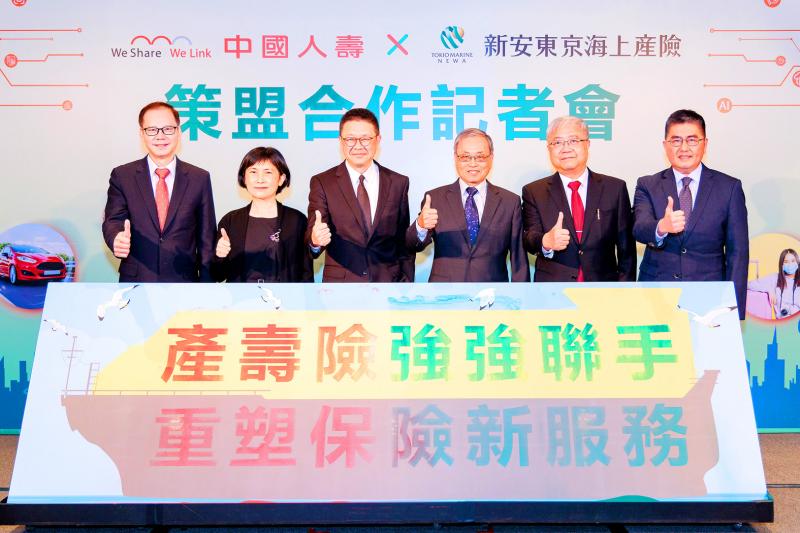China Life Insurance Co (中國人壽) and Tokio Marine Newa Insurance Co (新安東京海上產險) yesterday said they have formed a partnership to jointly promote and expand their insurance product offerings and market.
Property insurer Tokio Marine Newa is to train China Life’s about 15,000 sales agents, including helping them pass licensure tests to be able to register as Tokio Marine’s sales agents, the two companies told a joint news conference in Taipei.
The sales agents can then sell both China Life’s life insurance policies and Tokio Marine’s property insurance policies, including car, fire and travel insurance, the companies said.

Photo courtesy of China Life Insurance Co via CNA
Tokio Marine, which has only 300 sales agents, hopes to improve the visibility of its products with the help of China Life’s sales agents, while China Life hopes to satisfy the needs of its consumers for property insurance, they said.
China Life is a unit of China Development Financial Holding Corp (中華開發金控), while Tokio Marine is a joint investment between Yulon Group (裕隆集團) and Japan-based Tokio Marine Group.
Asked why China Development Financial did not consider setting up its own property insurance unit, China Life president Stephanie Hwang (黃淑芬) said that cultivating talent and establishing a network would take a lot of time and resources, but “our clients have a need for property insurance right now.”
Given Tokio Marine’s expertise in the field of property insurance and as it shares the same business concepts as China Life, the collaboration makes sense and should create a win-win situation, she said, adding that both companies expect the partnership to boost their sales this year.
Although the Financial Supervisory Commission allows insurers with different parent companies to share consumers’ data for marketing if they have obtained consumers’ consent, most local insurers prefer to cooperate with affiliated firms.

SEEKING CLARITY: Washington should not adopt measures that create uncertainties for ‘existing semiconductor investments,’ TSMC said referring to its US$165 billion in the US Taiwan Semiconductor Manufacturing Co (TSMC, 台積電) told the US that any future tariffs on Taiwanese semiconductors could reduce demand for chips and derail its pledge to increase its investment in Arizona. “New import restrictions could jeopardize current US leadership in the competitive technology industry and create uncertainties for many committed semiconductor capital projects in the US, including TSMC Arizona’s significant investment plan in Phoenix,” the chipmaker wrote in a letter to the US Department of Commerce. TSMC issued the warning in response to a solicitation for comments by the department on a possible tariff on semiconductor imports by US President Donald Trump’s

The government has launched a three-pronged strategy to attract local and international talent, aiming to position Taiwan as a new global hub following Nvidia Corp’s announcement that it has chosen Taipei as the site of its Taiwan headquarters. Nvidia cofounder and CEO Jensen Huang (黃仁勳) on Monday last week announced during his keynote speech at the Computex trade show in Taipei that the Nvidia Constellation, the company’s planned Taiwan headquarters, would be located in the Beitou-Shilin Technology Park (北投士林科技園區) in Taipei. Huang’s decision to establish a base in Taiwan is “primarily due to Taiwan’s talent pool and its strength in the semiconductor

Industrial production expanded 22.31 percent annually last month to 107.51, as increases in demand for high-performance computing (HPC) and artificial intelligence (AI) applications drove demand for locally-made chips and components. The manufacturing production index climbed 23.68 percent year-on-year to 108.37, marking the 14th consecutive month of increase, the Ministry of Economic Affairs said. In the first four months of this year, industrial and manufacturing production indices expanded 14.31 percent and 15.22 percent year-on-year, ministry data showed. The growth momentum is to extend into this month, with the manufacturing production index expected to rise between 11 percent and 15.1 percent annually, Department of Statistics

An earnings report from semiconductor giant and artificial intelligence (AI) bellwether Nvidia Corp takes center stage for Wall Street this week, as stocks hit a speed bump of worries over US federal deficits driving up Treasury yields. US equities pulled back last week after a torrid rally, as investors turned their attention to tax and spending legislation poised to swell the US government’s US$36 trillion in debt. Long-dated US Treasury yields rose amid the fiscal worries, with the 30-year yield topping 5 percent and hitting its highest level since late 2023. Stocks were dealt another blow on Friday when US President Donald